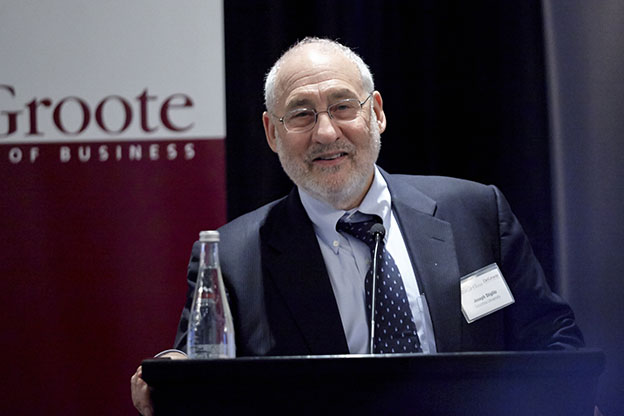Economic outlook ‘truly dismal’ without major policy changes: Former World Bank chief

Joseph Stiglitz, winner of the 2001 Nobel Prize in economics, spoke at Thursday's Horizons ETFs Insight Lecture, presented by the DeGroote School of Business and Horizons Exchange Traded Funds in Toronto.
Economics is called the dismal science for good reason, Joseph Stiglitz reminds people. The Nobel Prize winning economist’s pessimistic outlook for the U.S. and European economies supports the validity of that label.
Without a rapid shift towards fiscal stimulus, the New York-based economist says, the U.S. economy will likely experience a long-term economic malaise of the kind that ensnared Japan for more than two decades – and the Japanese experience would look almost gentle in comparison.
Stiglitz was speaking in Toronto Thursday morning, delivering the Horizons ETFs Insight Lecture, presented by the DeGroote School of Business and Horizons Exchange Traded Funds.
As for Europe, large parts of the continent are mired in depression, not merely recession, with plummeting real incomes and massive unemployment, particularly among young people – that is, those who have not already fled devastated economies like Spain or Greece.
As a result, the global outlook, he says, will be truly dismal without major policy changes in both regions that go beyond using just monetary instruments and embrace government spending and public investment geared to growth. However, he says, the prospects of political support for such measures seem bleak right now.
The implications of Stiglitz’s message are enormous for Canada, because it signals serious long-term weakness for two of this country’s major trade partners – the U.S. and most recently Europe are partners in momentous free trade agreements with Ottawa. With China’s economic growth more uncertain, Stiglitz’s prognostications suggest a hard time ahead for Canada`s export sector.
Stiglitz, a former World Bank chief economist and current Columbia University teacher, has been a strong advocate of activist governments and public policies aimed at combating economic inequality. He is a prolific writer of articles and of books such as his 2012 work, titled The Price of Inequality, How Today’s Divided Society Endangers Our Future.
He pointed out that U.S. policy-makers have relied on monetary measures as the sole instrument to drive recovery , but the major product of those policies in isolation have been buoyant stock markets – and a continued concentration of wealth among the highest income earners. The policies have taken purchasing power out of the hands of the “bottom 80 per cent” who tend to consume a much higher proportion of their incomes than the elite earners.
As a result, the U.S. situation will remain a paradox of marginal or zero economic growth combined with large jobless percentages by historical measure. For the U.S. economy he painted a picture of a disturbing puzzle – that five and a half years since the Lehman Brothers collapse, the economy is officially out of the recession, “but most Americans don’t know it” in terms of their share of incomes and full-time employment.
“Our economies have not been delivering for very large fractions of the population,” he says.
The stakes are high, he said. The median inflation-adjusted income of Americans, he pointed out, is lower than it was 25 years ago. The situation for working-age males is most serious – median income is lower than 40 years ago. While some sectors are doing well, they are not necessarily big creators of quality jobs – in the shale gas boom and high technology, for example. Apple employs 49,000 Americans, but most of its jobs are in its retail operations, he said.
Young people are chronically underemployed which means they are not getting critical on-the-job skills, thus undermining long-term growth. “For the first time, the U.S. has developed a problem of long-term unemployment,” he argued, similar to what Europe has experienced.
He identified a cocktail of problems holding back the global economy: lack of aggregate demand; global financial imbalances; intense structural transformation (a shift in the developed world to services from manufacturing, for example); a dysfunctional financial sector; public and business austerity ; and growing inequality. The underlying theme is that markets are not working as well as they should.
He sees increased recognition for how economic inequality is tied into both lagging economic performance and morality – for example, in the recent election of a New York mayor who is committed to equality of opportunity. “It has reached the point where [inequality] is politically relevant,” he says, with an eye ahead to a future-defining 2016 presidential election.
Business journalist Gordon Pitts recently joined the DeGroote School of Business as Business Writer-in-Residence following a 30-year career, most notably at The Globe and Mail.
